外研版英语八年级下册Module 8 Time off基础巩固与复习 课件(共21张PPT)
文档属性
| 名称 | 外研版英语八年级下册Module 8 Time off基础巩固与复习 课件(共21张PPT) | 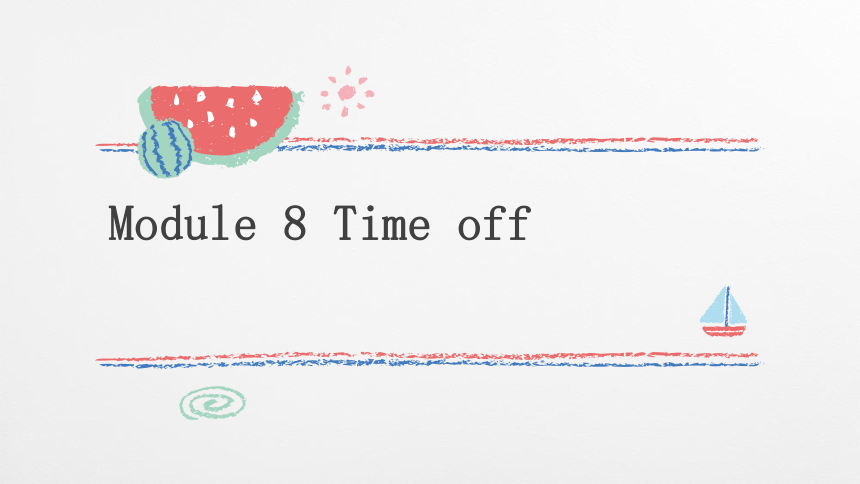 | |
| 格式 | zip | ||
| 文件大小 | 1.1MB | ||
| 资源类型 | 教案 | ||
| 版本资源 | 外研版 | ||
| 科目 | 英语 | ||
| 更新时间 | 2020-06-23 13:20:08 | ||
图片预览

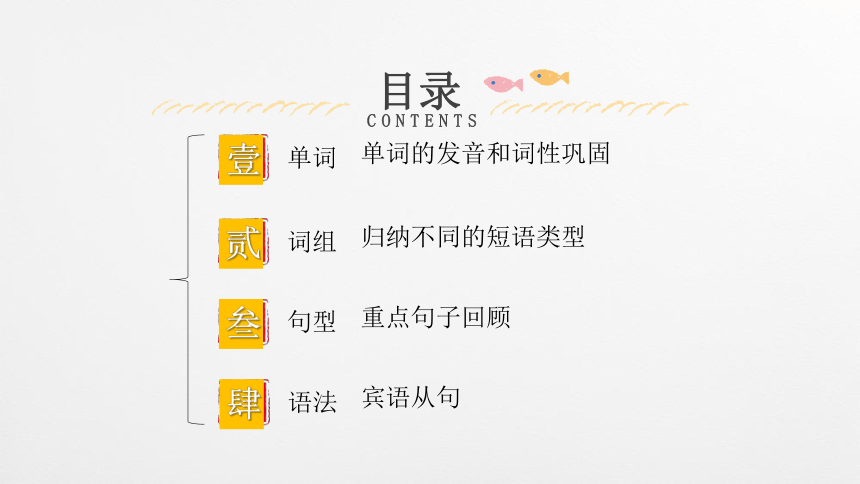
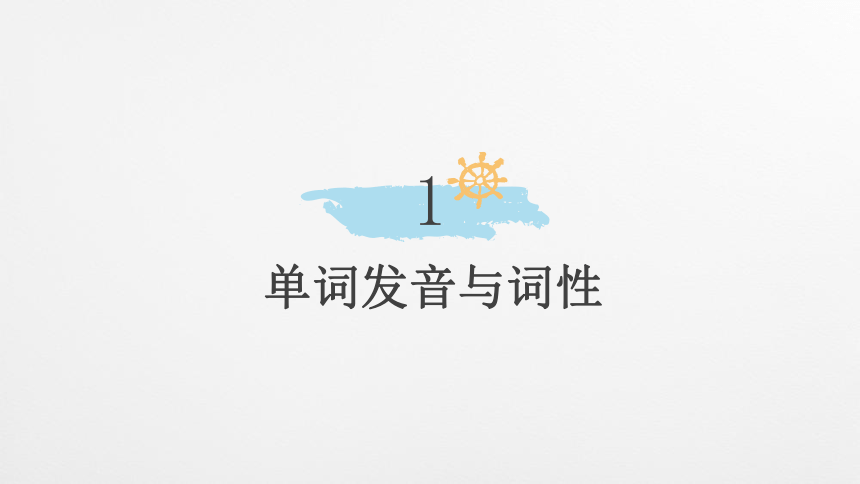
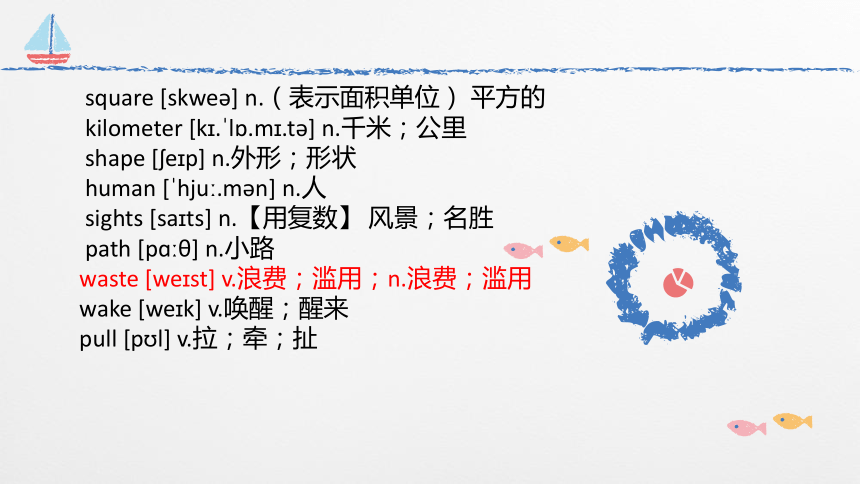
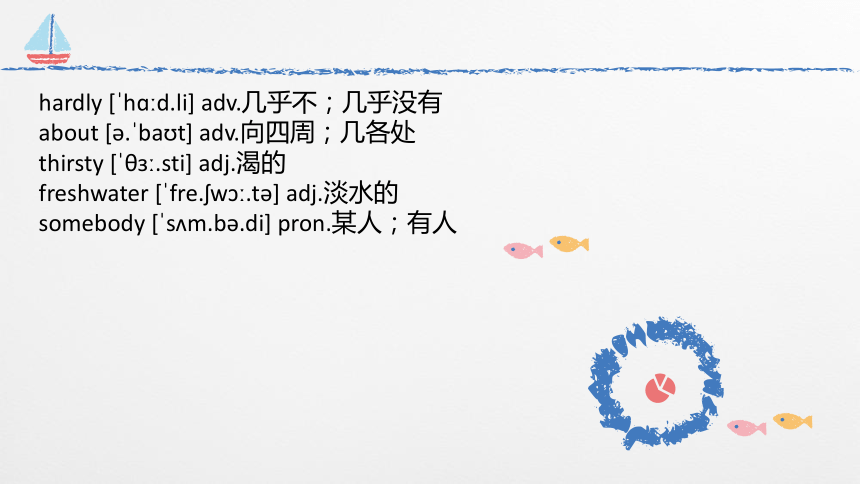
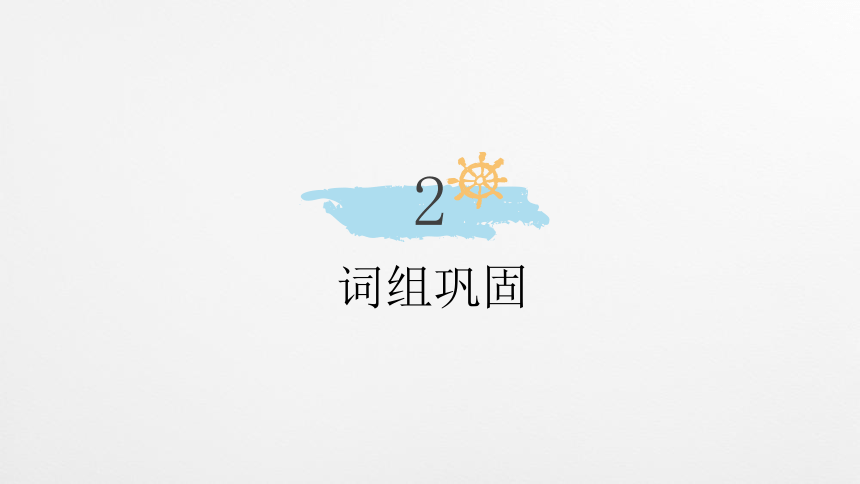
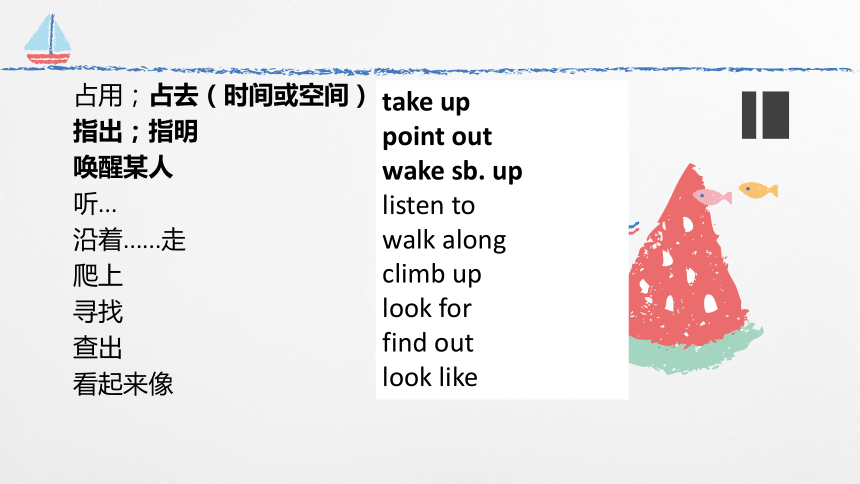
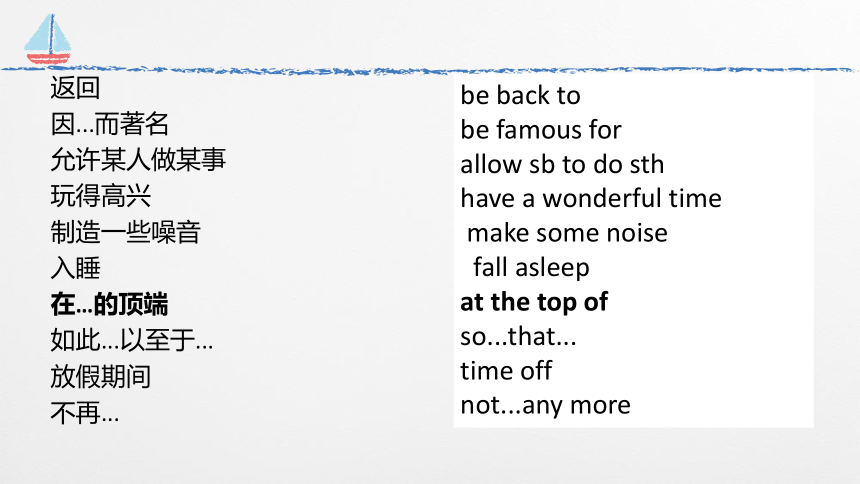
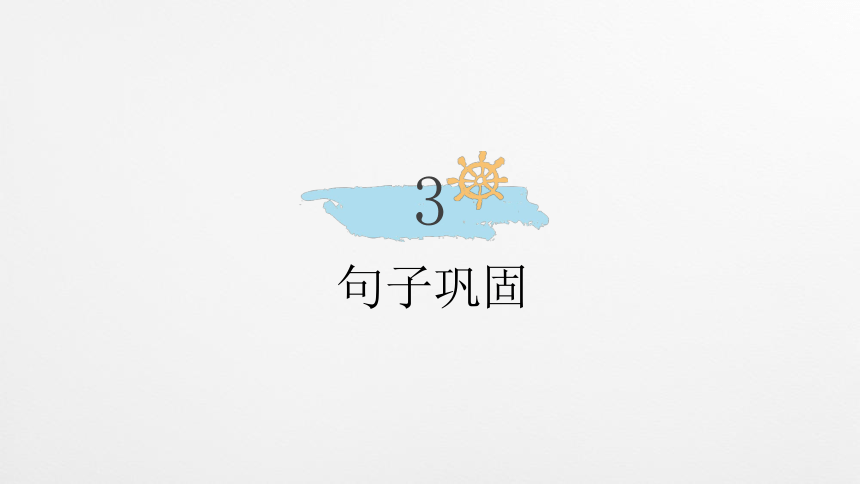
文档简介
(共21张PPT)
Module
8
Time
off
目录
CONTENTS
壹
单词
贰
词组
叁
句型
肆
语法
单词的发音和词性巩固
归纳不同的短语类型
重点句子回顾
宾语从句
单词发音与词性
1
square
[skwe?]
n.(表示面积单位)
平方的
kilometer
[k?.?l?.m?.t?]
n.千米;公里
shape
[?e?p]
n.外形;形状
human
[?hju?.m?n]
n.人
sights
[sa?ts]
n.【用复数】
风景;名胜
path
[pɑ?θ]
n.小路
waste
[we?st]
v.浪费;滥用;n.浪费;滥用
wake
[we?k]
v.唤醒;醒来
pull
[p?l]
v.拉;牵;扯
hardly
[?hɑ?d.li]
adv.几乎不;几乎没有
about
[?.?ba?t]
adv.向四周;几各处
thirsty
[?θ??.sti]
adj.渴的
freshwater
[?fre.?w??.t?]
adj.淡水的
somebody
[?s?m.b?.di]
pron.某人;有人
词组巩固
2
占用;占去(时间或空间)
指出;指明
唤醒某人
听...
沿着......走
爬上
寻找
查出
看起来像
take
up
point
out
wake
sb.
up
listen
to
?
walk
along
?
climb
up
?
look
for
find
out
?
look
like
?
返回
因...而著名
允许某人做某事
玩得高兴
制造一些噪音
入睡
在…的顶端
如此...以至于...
放假期间
不再...
be
back
to
?
be
famous
for
?
allow
sb
to
do
sth
?
have
a
wonderful
time
?make
some
noise
??fall
asleep
?
at
the
top
of
so...that...
?
time
off
?
not...any
more
句子巩固
3
1.如此安静,以至于我甚至能听到鸟儿在唱歌。
?It’s
so?quiet
that?I
can
even
hear
the
birds
singing!?
2.我难以置信我们身处城市中心。
I
can
hardly?believe
we're
in
the
city
centre.??
3.这个公园因它的湖泊而著名。
This
park
is
famous
for?its
lake.
4.这个湖泊占据了公园面积的一半以上。
The
lake
takes
up
over
half
of
the
park
area.?
5.我保证会给你写信。
I
promised
to?write?to?you.?
6.昨晚,我们在小湖边宿营。
Last
night
we
camped
by
a
small
lake.?
7.噪音吵醒了每一个人。
The
noise?woke?everybody
up.
8.我们出来了,没有制造任何噪音。
We
came
out?without?making
any
noise.?
9.洞庭湖是中国第二大淡水湖。??
Dongting
Lake?is
the
second
largest?freshwater
lake
in
China.?
宾语从句
4
宾语从句
1.
宾语从句定义
第六模块复习了简单句的几种基本句型,
其中有一种是“主语+谓语+宾语”的结构。
其中,
名词、代词、动词的-ing形式或to
do形式都可以作宾语,
例如buy
a
book,
beat
him,
stop
doing
sth.,
want
to
do
sth.等。
这些例子中的宾语是用一个单词或短语来表达的。
但是,
当要用英语表达“我知道你昨天去看电影了”时,
我们就无法在know后用一个单词表达出“你昨天去看电影了”这个意思。“你昨天去看电影了”这个结构中包含行为本身,
行为的发出者和行为的承受者,是一个完整的句子,
因此只能用句子表达。
这种放在动词后面作宾语的句子,
我们称为“宾语从句”。
?2.
宾语从句分为三类:
(1)that
引导的宾语从句
I
hope
(that)
it
will
snow
this
winter.
我希望这个冬天下雪。
(2)whether/if
引导的宾语从句
I’m
not
sure
if
he
will
come.?
我不确定他明天是否来。
(3)疑问词引导的宾语从句
I
want
to
know
what
he
will
do
next.?
我想知道接下来他要做什么。
3.
that引导的宾语从句
当谓语动词表示肯定的概念,如“希望、相信、知道、说”时,其后面的句子一般用that引导。that
没有任何词汇含义,只有语法功能,目的是使读者清楚后面的句子是宾语从句。多数情况下?that
可以省略。例如:
I
hope
(that)
it
will
snow
this
winter.
我希望这个冬天下雪。
Betty
thinks
(that)
trees
can
improve
the
air.?
贝蒂认为树木可以改善空气。
常接?that
宾语从句的谓语动词有:
believe,
expect,
explain,
feel,
hear,
hope,
imagine,
prefer,
promise,
report,
say,
see,
tell,
think,
under,
stand,
warn,
wish等。
4.
宾语从句的时态
主句中谓语动词是一般现在时,从句中谓语动词的时态不受限制,
可根据具体情况判断时态;主句中谓语动词是一般过去时,
从句中也必须要用某种过去时态,以保持时态的前后呼应。
注意当宾语从句表示的是客观真理、科学原理、自然现象、名言时,则用一般现在时,不受主句时态的限制。
试比较:?
He
says
that
he
wants
to
see
him
as
soon
as
possible.?
他说他想尽快见到他。(现在)?
He
said
that
he
wanted
to
see
him
as
soon
as
possible.?
他说他想尽快见到他。(过去)?
He
says
that
he
is
mending
his
bike.
他说他正在修理自行车。(现在)
He
said
that
he
was
mending
his
bike.
他说他正在修理自行车。(过去)
The
teacher
told
us
that
the
earth
goes
round
the
sun.?
老师告诉我们地球绕着太阳转。
5.
宾语从句的否定转移
主句是?I/We
think/suppose/guess/
believe
等,从句中的否定习惯上要转移到主句中,这就是否定转移。
我认为鸡不会游泳。?
误:I
think
chickens
can
not
swim.?
正:I
don't
think
chickens
can
swim.
本节内容回顾
壹
单词
贰
词组
叁
句型
肆
语法
单词的发音和词性巩固
归纳不同的短语类型
重点句子回顾
宾语从句
Thank
you!
Module
8
Time
off
目录
CONTENTS
壹
单词
贰
词组
叁
句型
肆
语法
单词的发音和词性巩固
归纳不同的短语类型
重点句子回顾
宾语从句
单词发音与词性
1
square
[skwe?]
n.(表示面积单位)
平方的
kilometer
[k?.?l?.m?.t?]
n.千米;公里
shape
[?e?p]
n.外形;形状
human
[?hju?.m?n]
n.人
sights
[sa?ts]
n.【用复数】
风景;名胜
path
[pɑ?θ]
n.小路
waste
[we?st]
v.浪费;滥用;n.浪费;滥用
wake
[we?k]
v.唤醒;醒来
pull
[p?l]
v.拉;牵;扯
hardly
[?hɑ?d.li]
adv.几乎不;几乎没有
about
[?.?ba?t]
adv.向四周;几各处
thirsty
[?θ??.sti]
adj.渴的
freshwater
[?fre.?w??.t?]
adj.淡水的
somebody
[?s?m.b?.di]
pron.某人;有人
词组巩固
2
占用;占去(时间或空间)
指出;指明
唤醒某人
听...
沿着......走
爬上
寻找
查出
看起来像
take
up
point
out
wake
sb.
up
listen
to
?
walk
along
?
climb
up
?
look
for
find
out
?
look
like
?
返回
因...而著名
允许某人做某事
玩得高兴
制造一些噪音
入睡
在…的顶端
如此...以至于...
放假期间
不再...
be
back
to
?
be
famous
for
?
allow
sb
to
do
sth
?
have
a
wonderful
time
?make
some
noise
??fall
asleep
?
at
the
top
of
so...that...
?
time
off
?
not...any
more
句子巩固
3
1.如此安静,以至于我甚至能听到鸟儿在唱歌。
?It’s
so?quiet
that?I
can
even
hear
the
birds
singing!?
2.我难以置信我们身处城市中心。
I
can
hardly?believe
we're
in
the
city
centre.??
3.这个公园因它的湖泊而著名。
This
park
is
famous
for?its
lake.
4.这个湖泊占据了公园面积的一半以上。
The
lake
takes
up
over
half
of
the
park
area.?
5.我保证会给你写信。
I
promised
to?write?to?you.?
6.昨晚,我们在小湖边宿营。
Last
night
we
camped
by
a
small
lake.?
7.噪音吵醒了每一个人。
The
noise?woke?everybody
up.
8.我们出来了,没有制造任何噪音。
We
came
out?without?making
any
noise.?
9.洞庭湖是中国第二大淡水湖。??
Dongting
Lake?is
the
second
largest?freshwater
lake
in
China.?
宾语从句
4
宾语从句
1.
宾语从句定义
第六模块复习了简单句的几种基本句型,
其中有一种是“主语+谓语+宾语”的结构。
其中,
名词、代词、动词的-ing形式或to
do形式都可以作宾语,
例如buy
a
book,
beat
him,
stop
doing
sth.,
want
to
do
sth.等。
这些例子中的宾语是用一个单词或短语来表达的。
但是,
当要用英语表达“我知道你昨天去看电影了”时,
我们就无法在know后用一个单词表达出“你昨天去看电影了”这个意思。“你昨天去看电影了”这个结构中包含行为本身,
行为的发出者和行为的承受者,是一个完整的句子,
因此只能用句子表达。
这种放在动词后面作宾语的句子,
我们称为“宾语从句”。
?2.
宾语从句分为三类:
(1)that
引导的宾语从句
I
hope
(that)
it
will
snow
this
winter.
我希望这个冬天下雪。
(2)whether/if
引导的宾语从句
I’m
not
sure
if
he
will
come.?
我不确定他明天是否来。
(3)疑问词引导的宾语从句
I
want
to
know
what
he
will
do
next.?
我想知道接下来他要做什么。
3.
that引导的宾语从句
当谓语动词表示肯定的概念,如“希望、相信、知道、说”时,其后面的句子一般用that引导。that
没有任何词汇含义,只有语法功能,目的是使读者清楚后面的句子是宾语从句。多数情况下?that
可以省略。例如:
I
hope
(that)
it
will
snow
this
winter.
我希望这个冬天下雪。
Betty
thinks
(that)
trees
can
improve
the
air.?
贝蒂认为树木可以改善空气。
常接?that
宾语从句的谓语动词有:
believe,
expect,
explain,
feel,
hear,
hope,
imagine,
prefer,
promise,
report,
say,
see,
tell,
think,
under,
stand,
warn,
wish等。
4.
宾语从句的时态
主句中谓语动词是一般现在时,从句中谓语动词的时态不受限制,
可根据具体情况判断时态;主句中谓语动词是一般过去时,
从句中也必须要用某种过去时态,以保持时态的前后呼应。
注意当宾语从句表示的是客观真理、科学原理、自然现象、名言时,则用一般现在时,不受主句时态的限制。
试比较:?
He
says
that
he
wants
to
see
him
as
soon
as
possible.?
他说他想尽快见到他。(现在)?
He
said
that
he
wanted
to
see
him
as
soon
as
possible.?
他说他想尽快见到他。(过去)?
He
says
that
he
is
mending
his
bike.
他说他正在修理自行车。(现在)
He
said
that
he
was
mending
his
bike.
他说他正在修理自行车。(过去)
The
teacher
told
us
that
the
earth
goes
round
the
sun.?
老师告诉我们地球绕着太阳转。
5.
宾语从句的否定转移
主句是?I/We
think/suppose/guess/
believe
等,从句中的否定习惯上要转移到主句中,这就是否定转移。
我认为鸡不会游泳。?
误:I
think
chickens
can
not
swim.?
正:I
don't
think
chickens
can
swim.
本节内容回顾
壹
单词
贰
词组
叁
句型
肆
语法
单词的发音和词性巩固
归纳不同的短语类型
重点句子回顾
宾语从句
Thank
you!
同课章节目录
- Module 1 Feelings and impressions
- Unit 1 It smells delicious.
- Unit 2 I feel nervous when I speak Chinese .
- Unit 3 Language in use
- Module 2 Experiences
- Unit 1 I've also entered lots of speaking competi
- Unit 2 They have seen the Pyramids.
- Unit 3 Language in use
- Module 3 Journey to space
- Unit 1 Has it arrived yet?
- Unit 2 We have not found life on any other planet
- Unit 3 Language in use
- Module 4 Seeing the docto
- Unit 1 I haven't done much exercise since I got m
- Unit 2 We have played football for a year now
- Unit 3 Language in use
- Module 5 Cartoons
- Unit 1 It's time to watch a cartoon.
- Unit 2 Tintin has been popular for over eighty yea
- Unit 3 Language in use
- Revision module A
- Module 6 Hobbies
- Unit 1 Do you collect anything ?
- Unit 2 Hobbies can make you grow as a person.
- Unit 3 Language in use
- Module 7 Summer in Los Angeles
- Unit 1 Please write to me and send me some photos
- Unit 2 Fill out a form and come to learn English
- Unit 3 Language in use
- Module 8 Time off
- Unit 1 I can hardly believe we are in the city ce
- Unit 2 We thought somebody was moving about
- Unit 3 Language in use
- Module 9 Friendship
- Unit 1 Could I ask if you've mentioned this to he
- Unit 2 I believe that the world is what you think
- Unit 3 Language in use
- Module 10 On the radio
- Unit 1 I hope that you can join us one day
- Unit 2 It seemed that they were speaking to me in
- Unit 3 Language in use
- Revision module B
